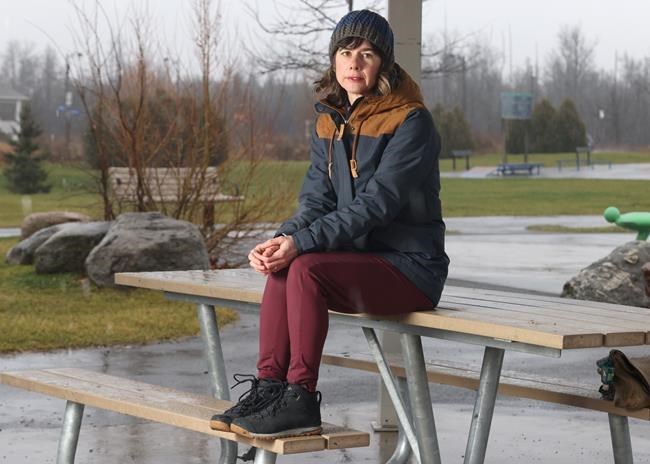MONTREAL — An Ottawa woman says her experience of trying to report a sexual assault that happened in another province led to a "convoluted" back-and-forth between police forces that has made her reconsider whether she wants to come forward at all.
Keara Dean said a news story that appeared in October about an arrest in a decades-old murder and sex assault in Quebec prompted her to contact police about a traumatic incident from her past that she had never reported.
The article described the arrest of Marc-André Grenon, who has been charged with the 2000 murder and sexual assault of a junior college student in Jonquiere, Que., as well as a separate attempted murder and sexual assault in Quebec City the same year.
Provincial police stated in the article that Grenon, 47, might have committed more assaults, and encouraged anyone with information to send a confidential tip to their criminal information unit via a toll-free number. Police also released photos of the suspect over the years so other potential victims could recognize him.
Dean said that while she can't say for sure, the events described bore similarities to a violent sexual assault she experienced in 1995 in Quebec City when she was 18 years old.
“The face (in the photos) looked sort of familiar, and I had a sexual violence incident in Quebec City when I was 18, and I'm now 45, so I immediately thought of this person who very much fit,” she said in a recent interview.
Dean said that after a couple of weeks of agonizing, she was motivated to come forward by the thought that she might help the investigation and was reassured by the fact that the tip line was described as confidential.
Dean said that when she dialed the number, the police officer who responded told her she would have to make the report in person to Ottawa police so her identity could be verified. He also told her not to tell anyone else about the story, she said.
When she called Ottawa police, she was told by the employee on the line that it wasn’t their jurisdiction and she would have to call Quebec provincial police again.
Dean said she felt angry and flustered that nobody seemed willing to help her "in any way, shape or form" with a process that was already so emotionally difficult.
"I didn't think it was going to be easy for me, but I didn't think it was going to be so convoluted, to have so many barriers thrown up in my face,” she said.
Unable to focus on anything else, Dean said she called Quebec police back. Their solution this time, she said, was for her to drive 40 minutes to Gatineau, Que., to give her report in person — advice she felt was very unhelpful given the emotional nature of the subject and the burden it places on her to take time out of her busy life as a mother of two.
Dean said the experience has left her reconsidering whether she wants to make a report at all.
"It makes me more fearful of the actual process and what it's going to look like," she said. She is wondering why police couldn't have at least offered an appointment or other options, such as reporting by Zoom.
Both Ottawa and Quebec provincial police said they couldn’t comment on specific cases but suggested that an experience like Dean's should not have happened.
“The standard practice of the Ottawa Police Service when it comes to victims coming forward with out-of-jurisdiction sexual assault complaints is to take a report,” Ottawa police said in a statement. “We recognize it takes courage to come forward, and there are several reasons why a victim may not be ready or able to report it when the assault occurred.”
Lt. Anne Mathieu of the Quebec provincial police said she was “very, very sorry” to hear of the negative experience, and would take action to ensure it doesn't happen again.
Without giving specifics, she said that it is possible in some circumstances that callers to the criminal information line could be directed to give their information to local police, who should take the report and send the file to Quebec.
She also said it was possible that the person who answered the phone in Quebec could have handled things differently, including offering other options for reporting.
“We are going to really raise awareness among the people who work on this line to be attentive to the information that is received and to the needs of the person who contacts us,” she said in a phone interview.
Both police services invited Dean to reach out to them.
Marie-Christine Villeneuve, a spokeswoman for Quebec victims services group CAVAC, said it’s important for police services to be receptive, because many victims agonize over the decision.
“The moment the person who is a victim gets up the courage to pick up the phone or show up at a police station to speak up and denounce her aggressor, we have to seize that opportunity,” she said in a phone interview.
Villeneuve said an experience like Dean’s is not the norm, and it could have been caused by “misunderstanding or miscommunication.” She also said people who are debating coming forward can reach out to organizations like hers, which offers help in navigating the process.
Dean says she’s unhappy with some of the advice she received from police, including the directive not to talk about her assault and the request to drive — presumably on her own — to report something extremely distressing. She also feels that the Quebec tip line is not as confidential as stated. But she feels it’s the process, rather than any one person, that let her down the most.
“It's the system that created a response to somebody who's experienced trauma, and increased that trauma,” she said.
This report by The Canadian Press was first published Dec. 2, 2022.
Morgan Lowrie, The Canadian Press

